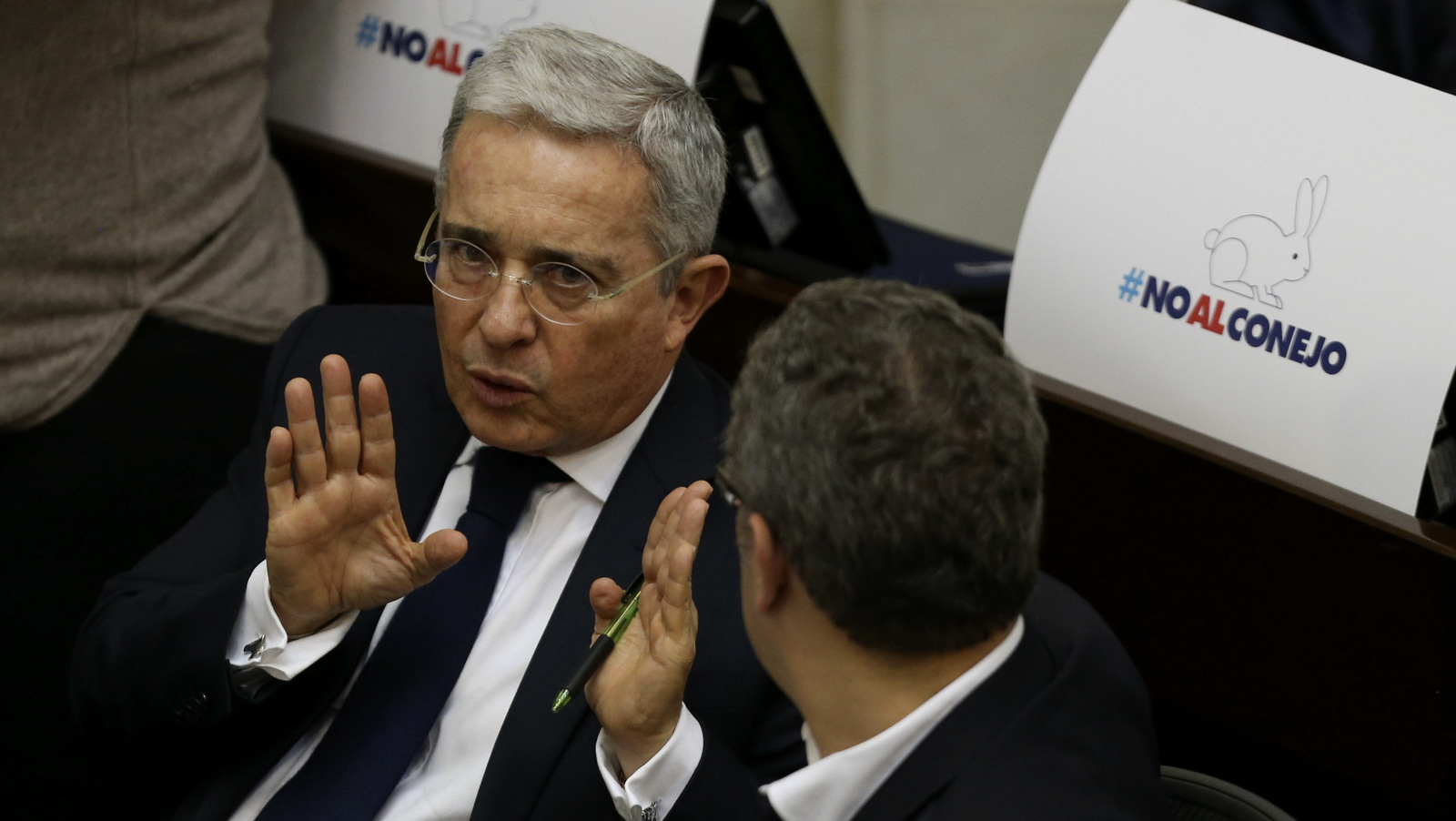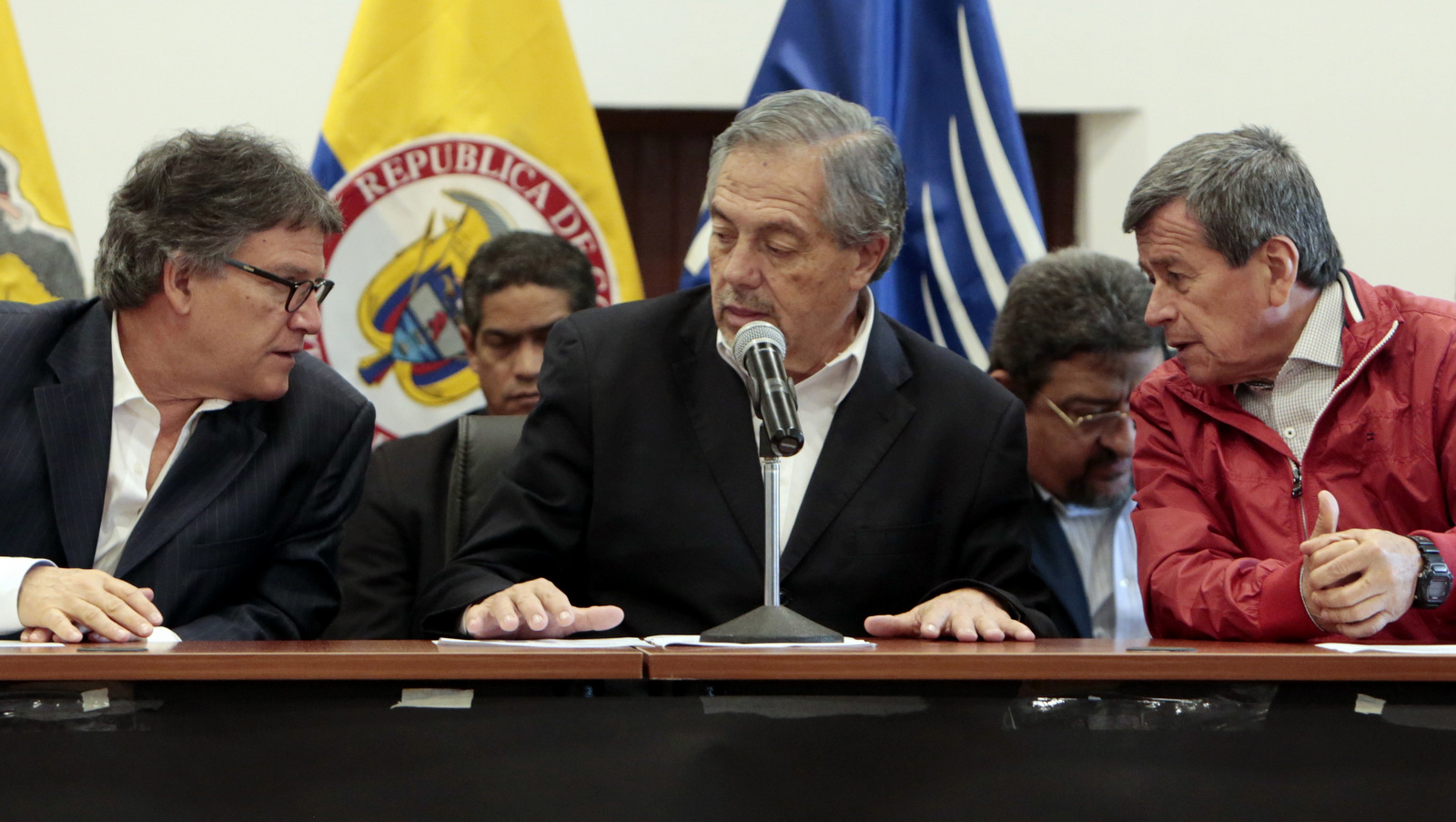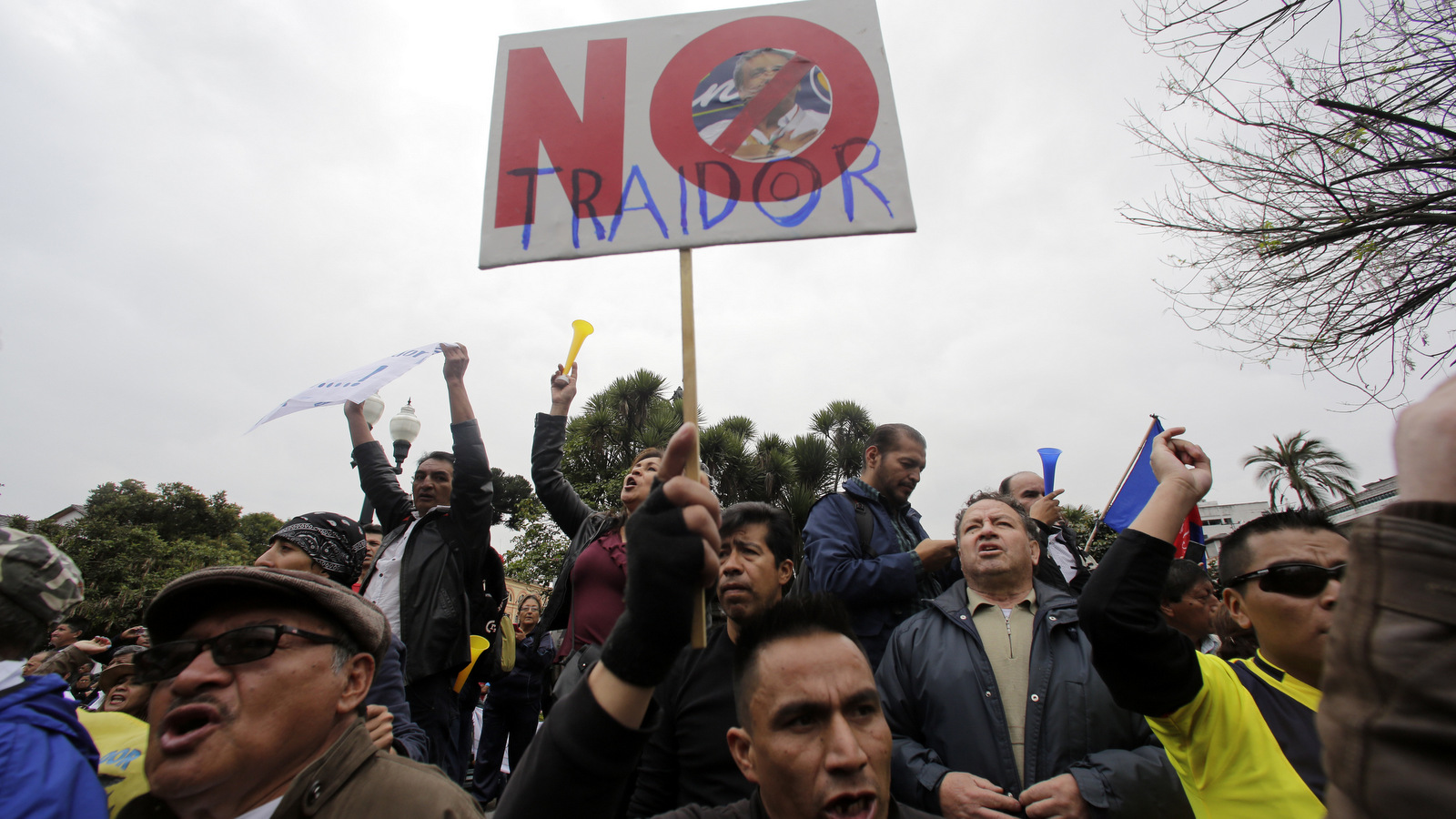QUITO, ECUADOR (Analysis) — Ecuador’s government has pulled the plug on its support for peace talks between the Colombian government and the leftist National Liberation Army (ELN), noting that it would not condone such talks as long as the ELN continues to wage its armed struggle against the state. The guerilla group remains the largest in Colombia with around 2,000 members. The two warring parties began negotiations last February in hopes of sealing a “complete peace.” As of March’s fifth round of peace talks, the negotiations were running smoothly and both sides had discussed the possibility of a bilateral ceasefire. Talks were to resume on May 18.
The suspension of Ecuador’s role as mediator comes amid its broader shift to the right and realignment with the United States by Ecuadorian President Lenin Moreno, as violence continues to seethe on the border with neighboring Colombia due to the alleged activities of an unrelated group. Both governments have launched raids on alleged members of the group.
Quito cited border insecurity, which recently claimed the lives of three workers for the center-right daily newspaper El Comercio, as part of the decision. According to Ecuador’s former foreign minister, the Colombian government learned of the cancellation through the media, “without the most elementary warning, no communication [from Ecuador]”.
Watch | Rebels kidnap couple on Ecuador and Colombia border
The Andean Republic has blamed former dissident members of the dissolved Revolutionary Armed Forces of Colombia – People’s Army (FARC-EP) for the killings, as well as other violent incidents that have occurred this year. The splinter group, known as the Oliver Sinisterra Front, allegedly consists of around 80 fighters and has been accused of playing a role in the cross-border drug trade.
“They want to use us as scapegoats for what others are doing,” an ELN representative told Reuters. Chile, Brazil, Norway and Cuba, who have accompanied the talks in Quito, have each offered to serve as hosts.
President Moreno accused the ELN of “terrorism” for its continued use of guerilla war methods, including bombings and the taking of prisoners:
I have asked the foreign minister of Ecuador to stop talks and our status as guarantor, while the ELN does not commit to leaving terrorist activities.”
The decision was lambasted by former Ecuadorian President Rafael Correa on Twitter, where he said:
Terrible news, not only for Colombia, but for all of our America … apologies to la Patria Grande [the Latin American Nation].”
Correa himself is facing revived accusations from the right-wing press of receiving financing from the FARC for his presidential campaigns to the tune of half a million dollars. The government of Moreno, Correa’s former vice president and handpicked successor, has promised to investigate the allegations. The attempt to further implicate the former president in such dramatic forms of corruption has drawn derision and mockery from leftist internet users, who have joked that soon the government will reveal new ties linking Correa to the legendary mobsters Al Capone, Frank Nitti and Don Corleone.
The Extreme Right applauds Moreno

Former president and opposition Senator Alvaro Uribe talks with Senator Ivan Duque at his desk covered in signs that say in Spanish “No to the rabbit,” a local way to refer to cheating, at the Senate in Bogota, Colombia, Nov. 24, 2016, the day the government and FARC signed a revised peace pact. (AP/Fernando Vergara)
Extreme right-wing former President and Senator Alvaro Uribe hailed what he called the “good example” set by the Ecuadorian president. Uribe is seen as the mentor of right-wing presidential candidate Ivan Duque, who maintains a substantial lead over his leftist opponent Gustavo Petro ahead of the May 27 elections.
The ELN’s conflict with the Colombian state began in 1964, when both the FARC and ELN took up arms for rural land rights following a campaign of violence targeting peaceful organizers and leftists throughout the country. While the FARC was a Marxist-Leninist organization, the ELN was oriented to a Liberation Theology and was headed by radical Catholic priests.
The ELN hopes to strike a deal with the government similar to the one that FARC struck in 2016, when the group disarmed and agreed to end its role in an armed conflict that left some 260,000 people confirmed dead, 60,000 unaccounted for, and 7 million displaced.

Representative of Colombia’s government Gustavo Bell, left, and Pablo Beltran, representative of the guerrillas of the National Liberation Army (ELN), right, sit on opposite sides of Ecuador’s representative Juan Meriguet during peace talks in Quito, Ecuador, March 22, 2018. (AP/Dolores Ochoa)
Armed strife remains a reality for the people of Colombia. Following the FARC’s disarmament and withdrawal from areas it controlled, extrajudicial killings of social movement leaders, disarmed guerillas and indigenous land defenders continued unabated. In many cases, communities witnessed right-wing violence committed by non-state actors such as the Gaitanista Self-Defense Forces of Colombia (AGC) rather than the hoped-for social peace.
Such paramilitaries are typically utilized as extra-legal forces meant to advance the interest of powerful oligarchs and multinational companies that covet resource-rich territories. Prominent politicians like Uribe supported paramilitaries that helped depopulate areas that were subsequently seized through illegal land-grabs. Many of these armed groups stocked their arsenals thanks to Plan Colombia, the 1999 counterinsurgency initiative that saw the U.S. pour billions of dollars into the country for the purpose of further militarizing the region.
Former President Uribe has been implicated in grave human rights abuses committed during his time in office from 2002 to 2010, with a majority of the 16,724 alleged combat kills by state security forces being civilian victim “false positives,” rather than the guerillas as which they were posthumously depicted.
Watch | A closer look at former Colombian president Uribe’s murky past
The right-wing leader has also been implicated in the formation of right-wing paramilitary death squads, by both concrete evidence and the testimonies of multiple witnesses. New reports allege that in 1995, when Uribe took office in Antioquia, he formed the Bloque Metro death squad as a response to the theft of his cattle by ELN combatants. The group, which included elite commandos trained by the United States, killed the cattle trader who bought the stolen livestock as well as the alleged ELN thief, before embarking on a wave of massacres in the region.
As a result, the term Uribismo (Uribe-ism) is synonymous with a sort of local fascism, fusing corruption with the systematic denial of human rights, especially for labor organizers, rights defenders, and communities of indigenous and African descent.
Critics of Ecuador’s president worry that having been elected with a mandate to continue Correa’s “Citizens’ Revolution,” Moreno is himself shifting toward an Ecuadorian variant of Uribismo.
Former Ecuadorian Foreign Minister Guillaume Long lamented Uribe’s praise for President Moreno, tweeting:
Moreno has announced that Ecuador will cease to host Colombian government-ELN peace talks underway since 2016. His timing, weeks before Colombian elections in which peace process plays a crucial role, is criminal. Unsurprisingly, Uribe and far right celebrate this latest betrayal https://t.co/XW6KdXQCp7
— Guillaume Long (@GuillaumeLong) April 19, 2018
The U.S. casts a shadow over the Andes

Supporters of former Vice President Jorge Glas, one holding a banner against current President Lenin Moreno that reads in Spanish “NO Traitor,” protest at the government palace during the weekly military changing of guard ceremony in Quito, Ecuador, April 2, 2018. (AP/Dolores Ochoa)
On Tuesday, Ecuador’s presidential Carondelet Palace hosted the ambassadors of the United States, Mexico, Spain, the U.K., China and France to discuss further cooperation in technological development.
The next morning, U.S. Ambassador Todd Chapman told local media that the FBI will continue to work alongside their Ecuadorian counterparts while the U.S. boosts its security assistance and training for Ecuador’s security forces.
The realignment with the U.S. includes a free-trade deal to be discussed later this year and increased generosity by the government toward mining firms in the form of new concessions, as well as an uptick in illegal mining operations and land grabs in environmentally sensitive regions of the country. Moreno has also sought to scrap Correa’s social-democratic reforms and impose austerity measures on the country, slashing the social spending that made his predecessor popular among poor and marginalized communities in the country.
Watch | Mass marches against Moreno’s government by Ecuador’s leftist opposition
Critics see Moreno’s new “war on narco-violence” as an attempt both to justify his retreat into Washington’s embrace and an excuse to revive old allegations against Correa. However, some have also criticized his security-focused campaign for failing to address the social causes of drug production, the drug trade, and cartel violence.
One need only ask the people of Mexico and Colombia, two major recipients of U.S. security aid, about how well a militarized approach to the “war on drugs” has worked for them in terms of ending the trade and addressing a problem rooted in the types of extreme poverty that prevail in the Ecuador-Colombia border region.
Top Photo | United States ambassador Todd Chapman (wearing white hat) and others accompanied by Ecuador’s Foreign Minister Fernanda Espinosa, left, leave the government palace after a meeting where the ambassadors showed their support for Ecuador’s government in view of the recent events on the border between Ecuador and Colombia, in Quito, Ecuador, April 17, 2018. (AP/Dolores Ochoa)
Elliott Gabriel is a former staff writer for teleSUR English and a MintPress News contributor based in Quito, Ecuador. He has taken extensive part in advocacy and organizing in the pro-labor, migrant justice and police accountability movements of Southern California and the state’s Central Coast.
The post Ecuador’s Drastic Pro-US Rightward Swing Continues with Disavowal of ELN-Colombia Peace Talks appeared first on MintPress News.
